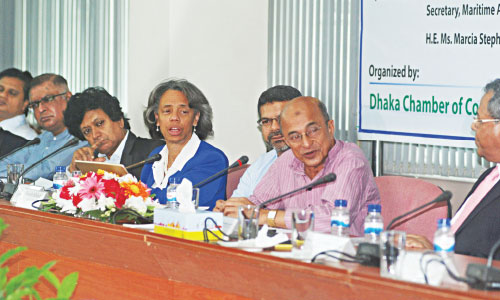B’desh makes no headway in offshore exploration
Bangladesh has yet to explore its vast offshore areas in the Bay of Bengal and keeps a huge quantity of potential resources including hydrocarbons and fish out of the country’s economy in the process.
Besides, experts said, seaport activities, cruise tourism and tidal wave for power generation have enormous potential for being monetised in the country’s economy.
They blamed lack of manpower and investment initiatives for the huge offshore potential to remain unexplored.
Md Khurshed Alam, secretary of the maritime unit of the foreign affairs ministry, on Saturday said Bangladesh can access only 50 kilometres with its fishing boats although it is entitled to extract resources in the area up to 664 km off the Chittagong coast in the Bay.
Bangladesh caught only 73,000 tonnes of sea fish in the past fiscal year of 2015-16 which is less than one per cent of the total fish caught in the Bay of Bengal in the period.
India, Sri Lanka, Myanmar and Thailand caught over eight million tonnes of fish last year from the Bay of Bengal, he said while addressing a seminar on ‘New Investment Horizon: Blue Economy’ hosted by the Dhaka Chamber of Commerce and Industry in the capital.
Now Bangladesh has 68,000 wooden fishing boats with the ability to catch fish in the sea up to 25 km off the coast while only 250 steel boats can access 50 km off the coast.
Khurshed said that no significant initiative had been made since the inception of the country in setting up academic institutions to develop human resources for the area.
After two successive orders issued by the international tribunals between March 2012 and July 2014, Bangladesh obtained a total of 1,18,813 sq km sea waters comprising territorial sea, exclusive economic zone, extending out 200-nautical-mile across sizable area and also 29 undesirable sovereign rights in the seabed extending as far as 354 -nautical-mile off the Chittagong port in the Bay of Bengal.
But the country has so far awarded only three shallow sea blocks to two international oil companies for oil and gas exploration.
Myanmar, however, signed 10 contracts with international companies for oil and gas exploration after settlement of maritime boundaries with Bangladesh and discovered at least two gas fields near the boundary, said energy expert Badrul Imam, also a geology professor at the University of Dhaka.
At the seminar, prime minister’s energy adviser Tawfiq-e-Elahi Chowdhury admitted that Bangladesh was way behind Myanmar in oil and gas exploration in the Bay of Bengal.
He, however, claimed that the prospect of oil and gas exploration dropped due to declining prices of oil on the global market.
Towfiq urged the country’s businessmen to invest in oil and gas exploration in the offshore areas as well in other potential businesses.
Although 90 per cent export and import are made through ocean, only 32 out of the 2,500 merchant ships are owned by Bangladeshi companies.
Keynote speaker Md Kawser Ahmed, chairman of the oceanography department of the University of Dhaka, said that local businessmen could explore the huge potential in the sea.
At the seminar, US ambassador to Dhaka Marcia Stephens Bloom Bernicat emphasised legal fishing to make it safe and sustainable.
It is the nations’ commitment to sustainable development of ocean resources so that no person, no group or refugee or no nation is left behind, she said adding that the oceans were at risk now for pollution, over fishing and global climate change.
News Courtesy: www.newagebd.net











